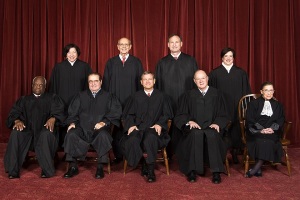The United States Supreme Court has said it will take up same-sex marriage in its current term.
The Court said in October it would not hear appeals on the issue. That was before a federal appeals court decision to uphold bans on same-sex marriage in Ohio, Tennessee, Michigan and Kentucky. That created a split between the 6th Circuit Court of Appeals and other appellate courts who had found similar bans unconstitutional.
St. Louis University law professor Marcia McCormick says the Court has used its ability to formulate the questions it will consider.
“The Court says that it is going to consider whether the 14th Amendment requires a state to license marriage between two people of the same sex and whether the 14th Amendment requires a state to recognize a marriage between two people of the same sex when their marriage was lawfully licensed and performed out-of-state,” said McCormick.
McCormick said whatever the Court’s ruling, it will certainly impact Missouri.
“If the Supreme Court rules that the 14th Amendment does not require a state to license a marriage between two people of the same sex … it means that Missouri’s constitutional provision on same-sex marriage is not a violation of the federal Constitution,” said McCormick. “On the other hand if the Court finds that the 14th Amendment does require a state to recognize a marriage between two people of the same sex, then Missouri’s Constitutional provision will be unconstitutional under the federal Constitution, and will not be able to be effective.”
The Court’s ruling could also fall “in between” those two outcomes.

Photo: “Supreme Court US 2010” by Steve Petteway, Collection of the Supreme Court of the United States – Roberts Court – The Oyez Project. Licensed under Public Domain via Wikimedia Commons
“If, for example, the Court said, ‘Well, the 14th Amendment doesn’t require that a state grant same-sex marriage licenses but the 14th Amendment does require that states recognize lawful marriages performed legally in other states, that in some ways is a middle ground,” said McCormick.
Courts in Missouri are dealing, in various stages, with separate issues related to gay marriage: whether Missouri employers must grant benefits to same-sex spouses of employees, whether county recorders of deeds should issue marriage licenses to same-sex couples, whether same-sex marriages in other states must be recognized, and whether Missouri courts can grant divorces to same-sex couples married in other states.
McCormick says if the Supreme Court does not rule that the 14th Amendment requires states to recognize same-sex marriage, Missouri could be left dealing with multiple issues.
“At least a couple of the legal victories that people have had in favor of same-sex marriage have relied on the federal Constitution, and so if the Supreme Court finds that the federal Constitution does not require a state to license people of the same sex to get married, it doesn’t overrule those cases but it means that they were wrongly decided and so they would probably have no legal effect,” said McCormick.
“But,” she adds, “there will still be piecemeal attacks on various limitations on same-sex marriage and the attacks will shift … they have to either find different constitutional provisions under the federal Constitution or something under the Missouri Constitution, which would be difficult just because the same-sex marriage ban is also in the Constitution.”
“It could also mean that the movement would move to the political system instead, and attempt to repeal the same-sex marriage ban that’s in the Constitution,” McCormick said.
The Court will hear oral arguments in April. It is anticipated to reach a decision before its term ends in late June, but McCormick says there is a slim chance the Court could hold the case over for re-argument in the next term.
Analysts disagree on the balance between conservative and liberal ideologies among the Supreme Court Justices. Listen as McCormick offers her assessment, and how it might play into the Court considering same-sex marriage; 2:32


